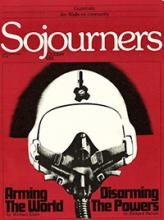Since the Reagan victory last November, the political Right has sought to consolidate its gains. Forces both inside and outside the government are moving to define a political consensus further to the right than ever before. Part of that strategy is the excluding, discrediting, and persecuting of those people and groups who fall outside the prescribed ideological boundaries.
Central to the political consensus the Right is seeking to forge is the idea that the greatest threat to peace today comes from the Soviet Union, and that most of the world's problems and conflicts are directly traceable to Moscow and its allies. Every development against U.S. interests is conveniently blamed on the Soviets. The U.S. government now can find Soviet involvement in almost any situation, the most recent example being charges of Russian meddling in El Salvador. Of course the Soviets do the same thing in reverse, blaming the United States for the resistance they're facing in Afghanistan.
Secretary of State Alexander Haig, Jr.'s comments on that charge are ironic. He attacked the Soviets for promoting the "bizarre theme" that the U.S. is "the source of the trouble" in Afghanistan and for refusing to negotiate a political settlement. "The Soviet Union must begin to understand that Afghan resistance and international pressure will be sustained," Haig declared. Substitute "United States" for "Soviet Union" and "El Salvador" for "Afghanistan," and the statement becomes a clear and accurate criticism of U.S. policy in Central America.
Read the Full Article

